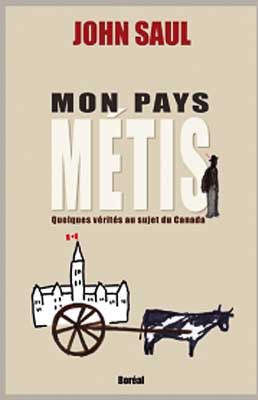MON PAYS MÉTIS – QUELQUES VÉRITÉS AU SUJET DU CANADA
Éditions du Boréal publié au Canada (Anglais), Canada (Francais)
- La première liste Maclean best-seller
- Le deuxième sur la liste des best-seller Toronto Star
- L’une des meilleures ventes de non-fiction en 2008 (The Globe and Mail)
Traduit de l’anglais par Rachel Martinez et Ève Renaud
« Il y a des choses qui nous ont échappé quelque part. Je pense que le métissage a été au fond occulté et a disparu de notre histoire. Il aura fallu le courage de John Saul pour tout à coup entreprendre d’écrire un ouvrage. Je trouve cela passionnant ! J’en ai appris beaucoup et je me sens moins ignorant. »
– Jacques Languirand, Radio-Canada, « Par quatre chemins »
Description
« Nous ne sommes pas une civilisation d’inspiration française ou britannique, » déclare John Saul. « Nous ne l’avons jamais été. »
Dans ce nouveau livre, John Saul poursuit son exploration de la psyché canadienne. En jetant une lumière originale et féconde sur notre histoire, il nous amène à remettre radicalement en question l’image que nous avons de nous-mêmes. « En ayant recours, pour nous définir, à un langage qui n’exprime ni notre véritable nature ni notre véritable mythologie, nous avons privé notre civilisation de sa force. Nous avons neutralisé notre capacité de discuter et d’agir d’une manière qui reflète notre inconscient collectif, nos exigences éthiques. »
Devant les problèmes auxquels fait face notre société, nos gouvernements ont trop souvent recours à des expédients indignes de nous. Nous nous imaginons jouer un certain rôle sur le plan international, mais nous le jouons rarement, ou encore de façon intermittente et timorée. Tout cela parce que nous sommes incapables d’accepter qui nous sommes vraiment, parce que nous nous sommes enfermés dans une définition réductrice de notre société, de notre histoire.
Nos élites se révèlent de plus en plus dysfonctionnelles, car au fond elles ne désirent pas gouverner le Canada tel qu’il est. Quant à l’ensemble des citoyens, ils montrent des signes d’incertitude et de frustration, ils ont l’impression de n’avoir plus de repères.
John Saul défend dans ce nouvel essai l’idée que nous formons une société métisse, construite sur les principes amérindiens de paix, de justice et de bon gouvernement. Voilà ce qui constitue le cœur de notre pays, de la mythologie canadienne. Si nous arrivons à adopter un langage qui reflète notre histoire véritable, nous pourrions redécouvrir la force de traduire nos conceptions en actes, la force d’agir conformément à notre nature profonde.
Critiques Littéraires
- Roberto Barzanti – Siena Corriere (en italien)
- Stéphane Lajoie – La Liberté
- François Gagnon – Impact Campus
- Roberto Barzanti – La voce del campo (en italien)
- Jean-Philippe Bergeron – Ici
- Mathieu Perreault – La Presse
Revues
Aboriginal peoples are one of Canada’s most rapidly growing demographic groups. Now at 1.2 million, they are close to the numbers estimated to have been here when Jacques Cartier first set foot on this land. An even larger number of us (1.8 million) claim aboriginal ancestry and both these numbers have been growing in recent censuses more rapidly than new births, suggesting that we are in fact witnessing a renaissance of aboriginal identity in this country – an emerging spirit that Saul is sensing. His book’s quickly achieving bestseller status also suggests he is tapping into an inchoate sense among non-aboriginal Canadians that we should be rethinking the stereotypes we learned in the history books of our youth and that are reinforced every few months by the relentless bad-news stories in the media. Maybe – maybe – Saul has begun the dialogue that will create a powerful new national narrative (the Greeks called it mythos) to reframe this relationship from one of ignorance and racism to that of equality and respect. »
Citations
Lesley Hughes – Winnipeg Free Press
« He suggests a new and believable understanding of how Canada has come to be what it is. A Fair Country has the potential to change the way Canadians see themselves forever. It offers a romantic and heroic vision, and it’s a stirring and unpretentious read. »
Haroon Siddiqui – Toronto Star
Aparna Sanyal – Montreal Gazette
Entrevues
- Cormac Rea – Ottawa XPress
- Joseph Planta – The Commentary
- *Kate Fillion – Maclean’s
- *Michael Valpy, plus excerpt from A Fair Country – Globe and Mail
- *Vivian Moreau – Victoria News
Commentaires
-
-
- *The Daily Gleaner
- Dan Gardner – Ottawa Citizen
- *Morley Walker – Winnipeg Free Press
- Op-Ed by John Ralston Saul, plus excerpt from A Fair Country – Ottawa Citizen
- Andrew Cohen – Ottawa Citizen
- Haroon Siddiqui, part 1 – Toronto Star and, part 2 – Toronto Star
- Editorial – Ottawa Citizen
- Lawrence Martin – Metro
- *Lawrence Martin – Globe and Mail
- Lawrence Martin – Globe and Mail
- Pascal Zamprelli – The McGill Reporter
- Linda Diebel – Toronto Star
-








